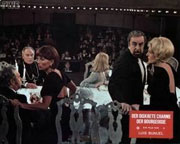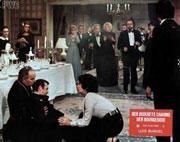|
|
|
Le Charme discret de la bourgeoisie (Der diskrete Charme der Bourgeoisie) par Luis Buñuel France / España / Italia 1972 avec: Fernando Rey (Rafaele Costa), Delphine Seyrig (Simone Thévenot), Stéphane Audran (Alice Sénéchal), Bulle Ogier (Florence), Jean-Pierre Cassel (Henri Sénéchal), Paul Frankeur (Thevenot), Bulle Ogier (Florence), Julien Bertheau (Bishop Dufour), Michel Piccoli (Ministre), Milena Vukotic (Ines the Maid), Maria Gabriella Maione (Le Guerilla), Claude Piéplu (Le Colonel), Muni (La paisanne) |
|
Lucia Bozzola, All-Movie Guide
Le charme discret est un film drôle, cela va sans dire. Mais sa nonchalance ne peut masquer sa férocité. Si la dernière œuvre de Buñuel compte désormais parmi ses plus grandes réussites, c'est bien parce que son metteur en scène, non content de moquer ou de dénoncer telle ou telle classe sociale, telle ou telle conduite ignoble ou grotesque, a encore la force de changer de style - marque d'un créateur en pleine possession de ses moyens. Délaissant aussi bien le surréalisme désormais "classique" de L'âge d'or que les récits plus linéaires et parfois directement fantastiques, il a su imposer une forme éclatée qui, par la force déroutante de ses allusions, références et impropriétés, conteste à son tour la bourgeoisie sur l'un des plans qui lui tiennent le plus à cœur : le plan formel où elle a coutume de se représenter et de se reconnaître. Frédéric Vitoux, Positif n° 146, janvier 1973
One of Luis Bunuel's greatest and funniest films, and the winner of a Best Foreign Film Oscar, THE DISCREET CHARM OF THE BOURGEOISIE is a brilliant surrealistic joke about a group of friends whose attempts to dine are continually thwarted. TV Guide Online Buñuel's account of the attempts of six wealthy people to sit down to dinner is the comedy of manners to end all comedies of manners. With la crème de la crème of European actors, Buñuel produces, in lieu of something edible, the secret ingredient of the bourgeois power base, which might be the desire for thwarted desire. Cuisine interruptus. As Raymond Durgnat wrote, "Their plague is not the Exterminating Angel but the Interrupting One.'La vie moderne est faite de ruptures.'" It's never the right time for sex or food—a theme that goes back to L'Age d'or—but the rituals of sangfroid continue in the face of a pot-smoking militia and terrorists at the door, the elusive leg-of-lamb and the rubber chicken, waking nightmares and walking dreams. If reality is a promise, so is consumption, and one can live on air. Pacific Film Archive
|
Director: Luis Buñuel Runtime: 101 min Awards: Academy Awards 1973 Oscar Best Foreign Language Film; Nominated Oscar Best Writing, Story and Screenplay Based on Factual Material or Material Not Previously Published or Produced Luis Buñuel, Jean-Claude Carrière // British Academy Awards 1974 Best Actress Stéphane Audran; Best Screenplay Luis Buñuel, Jean-Claude Carrière // French Syndicate of Cinema Critics 1973 Best Film Luis Buñuel // National Society of Film Critics Awards 1973 Best Director Luis Buñuel; Best Film |
|
Image Transfer Review: To commemorate the director's 100th birthday (Buñuel died in 1983), The Discreet Charm of the Bourgouisie was given a theatrical re-release, and this anamorphic transfer is from the newly struck 35mm interpositive from the original negative. The source is near flawless, with fine grain well represented. Colors are not overly vibrant, but the presentation is exceptional, aside from the subtitles, which have frequent spelling errors (in the feature and supplements) which prove distracting. Jeff Ulmer, www.digitallyobsessed.com
www.dvdangle.com |
The Discreet Charm of the Bourgeoisie |










